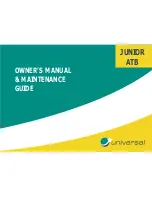
4 Adjustments
46
Figure 4.36
ADJUSTING THE HEADSET
The headset is an assembly of parts that connects the front fork
and the head tube of the frame. It is the rotational interface
that enables the fork to turn. There are two types of headsets:
threaded and threadless.
Adjusting a Threaded Headset
A typical threaded headset consists of two cups that are pressed
into the top and bottom of the head tube. Inside the two cups
are bearings which provide a low friction contact between the
bearing cup and the steerer. The short tube through which the
steerer of the fork passes is called the head tube.
Adjustment of the headset is needed if the headset is too loose
(shakiness), too tight (stiffness).
Note:
It is possible that the
bearings have become worn or damaged and cause stiffness.
Replacement of the parts may be necessary.
Conduct the following checks to determine if there is play in the
headset:
❶ Shakiness: Apply the front brake and push the handlebars
back and forth, front to back. Or if the bicycle is on a
workstand and the front wheel removed, push and pull on
the forks. If you feel a knocking sensation or "clunk" it
means the headset is too loose. Important! Use care with
suspension forks, because the legs may have play in sliders.
Grab upper portion of fork.
Figure 4.36
❷ Stiffness: Lift the front of the frame so the front wheel is
off the ground. The handlebar and wheel should flop to
one side or another. If there is drag or binding the headset
is too tight.
Headset
1
2
















































